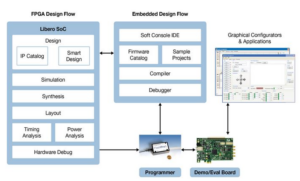Microsemi Corporation announced a new release of the Libero system-on-chip (SoC) PolarFire Design Suite, introducing lower static power devices to the PolarFire field-programmable-gate array (FPGA) family and delivering even greater productivity. Available now, the Libero SoC PolarFire Design Suite v2.2 gives designers access to “L” series PolarFire devices which deliver 30 percent lower static power over standard PolarFire FPGAs, making them ideal for low power portable defense and professional grade consumer systems.
With FPGAs, software is as important as the caliber of FPGAs being utilized for design. Microsemi’s investment in its Libero SoC PolarFire Design Suite continues to support the industry’s growing interest in FPGA technology. The newly enhanced design suite enables faster design completion with a 15 percent improvement in runtime for place and route, together with a 2.5x runtime improvement for programming file generation. The latest software release further reduces design flow bottlenecks with new support for pre-design transceiver modeling.
Since the first release of the Libero SoC PolarFire Design Suite, customers across communications, defense and industrial markets have adopted PolarFire FPGAs to substantially lower their systems’ total cost of ownership by taking advantage of the family’s 35 to 50 percent lower power advantage over competing devices, as well as the ability to operate in harsh thermal environments.
“Libero SoC PolarFire Design Suite version 2.2 further supports adoption of our PolarFire FPGAs, which expands our addressable FPGA market to more than $2.5 billion covering both the low end and mid-range markets,” said Rajeev Jayaraman, vice president of software and systems engineering at Microsemi. “The latest release’s introduction of lower static power devices and emphasis on productivity gains underscores our overall commitment to provide designers with tools which are comprehensive, easy to use and easy to adopt for low power FPGA designs.”
More details, including information on production power data for production-qualified devices, programming support for pre-production devices, and simulation support for industry-leading crypto, tamper, temperature voltage sensor (TVS) and system services, can be found in the Libero SoC PolarFire Design Suite v2.2 release notes, which can be downloaded here.


Leave a Reply